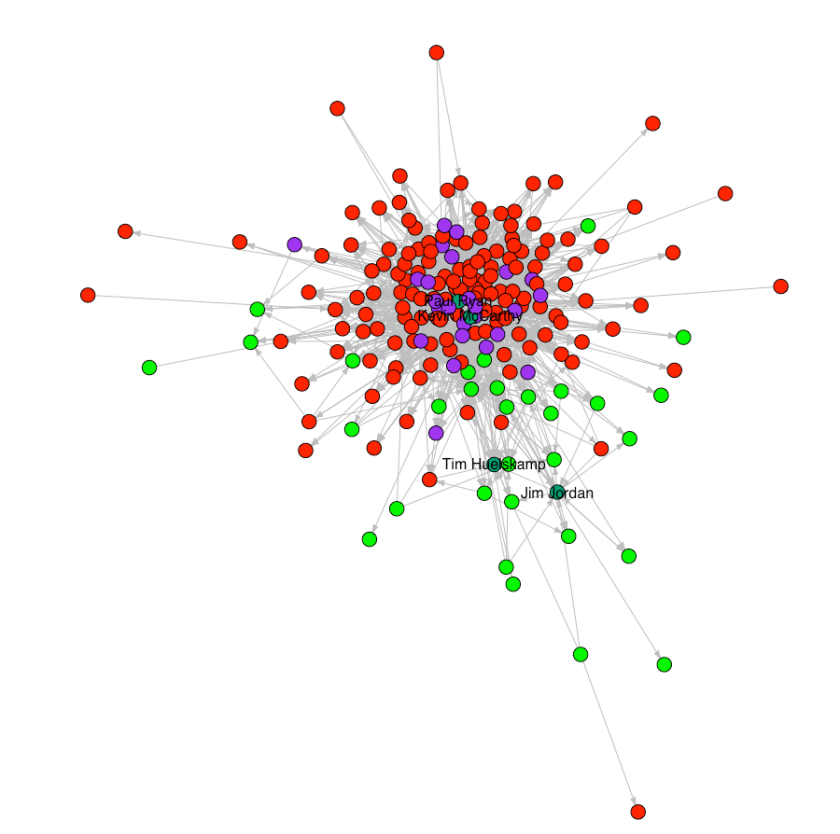By Zachary A. McGee of the University of Texas at Austin

At the start of the 115th Congress the Republican Party finally achieved unified government for the first time in more than a decade. Unfortunately for Speaker of the House Paul Ryan, his conference was not unified, and in fact, they were prepared to organize against him. My project seeks to highlight the power of an understudied set of actors who are important for understanding dynamics in the lower chamber of Congress.
Intraparty organizations, such as the House Freedom Caucus (HFC) or the Republican Study Committee (RSC), play a critical role in rank-and-file members extracting benefits from powerful party leaders. Ruth Bloch Rubin shows the power these members can have when they organize in her recent book Building the Bloc. More specifically, she shows that these groups are able to obtain better committee assignments, legislative concessions, and privileged access to party leaders. My project builds on her work by asking whether the extraction of these benefits might lead to retribution by the party in subsequent electoral cycles and how these groups might insulate themselves from that retribution.
In the modern Congress members, not their parties, generate most of their own financial support. That is, members build their own war chests and most members give some of their money to their fellow members. This practice is especially prominent among party leaders or ambitious members seeking more power but has also gradually grown to be used by almost all rank-and-file members as well. At the 2017 MPSA conference, I presented a paper entitled “Keeping Your Friends Close: A Study of Punishment and Intraparty Insurgency.” In that paper, I argue that, in the same way that party leaders can raise and distribute funds to members in return for loyalty, intraparty organization members can raise and distribute funds to fellow group members for their loyalty and protection after squabbles with party leaders.
To test my claims about intraparty organizations’ electoral cooperation and political party retribution, I examine the House Republican Party in the 2014 and 2016 election cycles. My analysis focuses on the well-established Republican Study Committee and the newly established, and already infamous, House Freedom Caucus. I use social network analysis to map the member-to-member contribution networks for all House Republicans. That is, I create a network wherein each member of the House Republican Party is linked to every other member they transferred money to in each given election cycle. The contribution data are from itemized Leadership Political Action Committee (LPAC) disbursement data from the Federal Election Commission.

Note: Rank-and-file members are red nodes, party leaders and committee chairs are purple nodes, and House Freedom Caucus members are green nodes.
My analysis reveals that members who chose to join the House Freedom Caucus altered their electoral disbursements to disproportionately support fellow group members. In fact, I find not only an increase in HFC members’ activity but also that they cluster together in the 2016 network. This cluster, defined by HFC-centric disbursements, reveals three potential HFC members that do not formally affiliate with the group: Pete Sessions (TX-32), Daniel Webster (FL-11), and Thomas Massie (KY-4). This finding is particularly interesting since the formal HFC roster is not public knowledge.
The pattern of support identified within the House Freedom Caucus does not exist among members of the larger and older Republican Study Committee. In other words, there is no clear financial relationship between members of this well-established intraparty organization. This finding illustrates that electoral coordination is not uniform across all intraparty organizations, which is interesting because we know almost nothing about what attributes of these groups leads to more or less cohesive electoral strategies. Clearly, more work to parse out across-group variation is necessary.
Finally, I find that non-HFC House Republicans opted to support HFC members less after the group formally organized (i.e. in the 2016 electoral cycle). While I provide evidence that co-partisans treat intraparty organization members differently before and after their formation, one can only speculate about the extent to which this coordination was ordered by party leaders. Whether or not party leaders are able to execute micro-level management of their members’ contributions to one another is an interesting question. Unfortunately, evidence to answer this question remains elusive. Nevertheless, the management of intraparty organizations by party leaders remains an area ripe for scholarly inquiry.
The analysis presented in my paper provides an important first step in understanding how intraparty organizations persist to consistently extract benefits from party leaders (e.g. the House Freedom Caucus) or become bloated and ineffective (e.g. the Republican Study Committee). Moreover, the collective partisan responses to intraparty organization coordination suggest that these groups are likely perceived to have some impact on the legislative process causing members to withhold support from their colleagues who opt-in to these groups. It remains unclear how successful these groups actually are in impacting the policy process though.
For scholars, this project also demonstrates that member-to-member contribution networks are a useful tool for studying intraparty organizations. I presented an empirical evaluation of the electoral coordination of these groups, but I also showed that networks can be used to identify potential group members for groups with secret membership rolls (like the HFC). This method can certainly be applied to other groups like the Tuesday Group or the Blue Dog Democrats.
Outside of its academic contributions, my paper suggests that pundits and the public alike should not underestimate the power and longevity of well-organized groups of rank-and-file members. These groups can successfully and consistently challenge powerful party leaders and coordinate for their own survival. The successes of the HFC since the start of the 115th Congress alone should cement this point. But, the HFC is not the first, nor will it be the last, group to form and extract benefits from party leaders. The takeaway for any given citizen then is this, if your member of Congress is a member of any intraparty organization then you should research that organization’s mission and take it into consideration when casting your next ballot.
[youtube https://www.youtube.com/watch?v=4A038Ts86ZI?rel=0&controls=0]

About the Author: Zachary A. McGee is a Ph.D. Candidate at the University of Texas at Austin. His research focuses on multiple aspects of intraparty organizations and their role in the U.S. Congress. More information can be found on his website www.zacharymcgee.net and he can be reached at zmcgee@utexas.edu.
McGee’s research “Keeping Your Friends Close: A Study of Punishment and Intraparty Insurgency“, presented at the 2017 MPSA conference, received the award for Best Paper Delivered by a Graduate Student.
